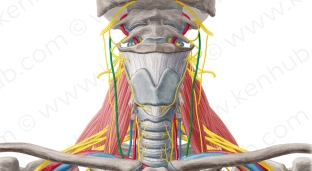Vagus nerve – the longest pair of cranial nerves (X pair), which contains motor, sensory and autonomic nerve fibers. The vagus nerve "goes down" from the hypothalamus and passes through the cervical and thoracic spine, and its terminal branches are located in the intestine. Thus, the vagus innervates a number of structures and organs of the human body, including the heart.
The vagus nerve activates the parasympathetic nervous system which is responsible for relaxing the body. 20% of the nerve fibers of the vagus control the organs and functions necessary for human life (heart, respiration, digestion, glands). The remaining 80% of the fibers are necessary for the transmission of information from the intestines to the brain.
Vagus Facts: What Vagus Affects
Vagus nerve:
- Prevents inflammation
Vagus, which innervates many internal organs, thanks to its fibers, catches signs of inflammation in time – cytokines or tumor necrosis factors, after which it notifies the brain to activate the production of anti-inflammatory neurotransmitters through the cholinergic anti-inflammatory pathway.
- Helps us remember
A University of Virginia study found that vagus nerve stimulation increased levels of the neurotransmitter norepinephrine in the amygdala, which improved memory.
The vagus nerve controls many bodily functions.
- Controls heart rate
The vagus nerve also controls the heart rate through electrical impulses sent to the sinoatrial node of the heart, where acetylcholine lowers the heart rate.
- Helps the body relax
When the sympathetic nervous system triggers the fight-or-flight response by releasing cortisol and adrenaline, the vagus nerve neutralizes the response by releasing acetylcholine.
- Provides communication between the intestines and the brain
Vagus also serves to connect the enteric nervous system (intestine) to the brain.
- Causes fainting
Vasovagal syncope is caused by overstimulation of the vagus nerve, resulting in a decrease in blood pressure and heart rate.
Vagus tone and stress response
Another important function of the vagus nerve is to "switch off" reactions to stress and restoration of the normal functioning of the body after a stressful situation.
It is important to understand that life under conditions of constant stress prevents the body from recovering normally. Hormones, the production of which is triggered under the influence of stress, actively block the process of healing and relaxation of the body. As you know, the consequences of stress can be:
- depression;
- anxiety;
- insomnia;
- anger;
- problems with decision making;
- impaired concentration, memory and attention;
- digestion disorders, etc.
So that the body can quickly "recover" after stress, the vagus nerve should be in good shape.
Deep breathing – one of the easiest, most affordable and safest ways to stimulate the vagus nerve on your own.

Vagus nerve stimulation as a new direction in medicine
Neurosurgeon Kevin Tracy was the first to show that vagus nerve stimulation can significantly reduce inflammation. The results of the rodent studies were so impressive that Dr. Tracy continued his research on volunteers. Due to the effect of electrical impulses generated by a special implant on the vagus, specialists managed to significantly reduce the manifestations of rheumatoid arthritis.
What else does vagus nerve stimulation help with?
Studies have shown that the neurotransmitter acetylcholine helps to suppress inflammation in the body. During stimulation of the vagus nerve, acetylcholine is actively produced, which not only allows you to relax, but also fights inflammation. Acetylcholine is also responsible for learning and memory.
Research has also linked the vagus nerve to improved neurogenesis and increased production of brain-derived neurotrophic factor, which is required by nerve cells. Therefore, the vagus is involved in the restoration of brain tissue and the regeneration of the whole organism.
The growth of stem cells is also directly related to the activity of the vagus nerve: its activation can stimulate the formation of new cells and the restoration of internal organs.
Yes, vagal electrical stimulation is currently FDA approved as an adjuvant therapy for the treatment of epilepsy and depression. In the future, scientists plan to develop the direction of bioelectronics, the main of which is the use of implants that affect the human nervous system in order to treat diseases.






Add a comment